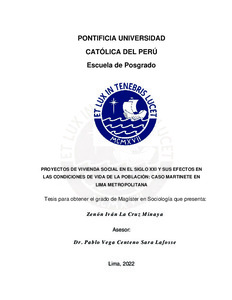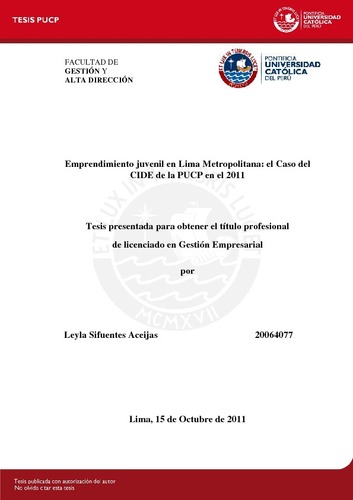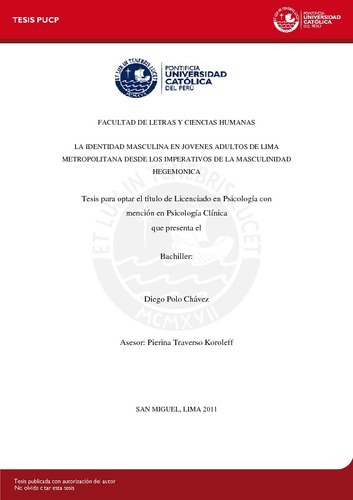| dc.contributor.advisor | Vega Centeno Sara Lafosse, Pablo | |
| dc.contributor.author | La Cruz Minaya, Zenón Iván | |
| dc.date.accessioned | 2022-04-13T21:21:03Z | |
| dc.date.available | 2022-04-13T21:21:03Z | |
| dc.date.created | 2022 | |
| dc.date.issued | 2022-04-13 | |
| dc.identifier.uri | http://hdl.handle.net/20.500.12404/22116 | |
| dc.description.abstract | La presente investigación se interesa por conocer los efectos que el Proyecto Piloto
Martinete-PPM, ha tenido en las condiciones de vida de la población beneficiaria.
Para ello, se realizó una aproximación a las percepciones de los residentes sobre
la unidad habitacional recibida, sobre su vida de vecindario -tanto dentro del
conjunto habitacional como en el entorno inmediato-, y el acompañamiento de las
instituciones públicas al proyecto.
El estudio encuentra que existe una alta satisfacción en la percepción referida a la
vivienda entregada como un aporte a las condiciones de vida de las familias, donde
muchas de ellas invierten en su expansión o también la utilizan como fuente de
ingresos, a partir de emprendimientos económicos.
La percepción de la vida vecinal en cambio presenta situaciones de distinto
tratamiento, con afinidades al interior del conjunto habitacional, pero sin la cohesión
dirigencial que caracterizó a la primera etapa del proyecto. En cambio, el entorno
colindante se percibe como fuente de amenazas, como robos, o la convivencia con
gente de mal vivir. Así mismo, los residentes perciben un débil acompañamiento de
los actores públicos, pese a que el proyecto se enmarcó en un ambicioso programa
nacional.
En base a ello, el proceso de investigación permite reflexionar, respecto a las
posibilidades de replicabilidad de proyectos de esta naturaleza, en términos de un
efectivo, eficiente y prospectivo seguimiento a las condiciones socio-urbanas,
generadas por la inserción residencial de población en áreas urbanas preexistentes. | es_ES |
| dc.description.abstract | This investigation is interested in knowing the effects that the Martinete-PPM Pilot
Project has had on the living conditions of the beneficiary population.
To do this, an approach was made to the perceptions of the residents about the
housing unit received, about their neighborhood life -both within the housing complex
and in the immediate surroundings-, and about the support of public institutions to
the project.
The study finds that there is a high satisfaction in the perception of the home given
as a contribution to the living conditions of families, where many of them invest in
their expansion or also use it as a source of income, from economic ventures.
On the other hand the perception of neighborhood life presents situations of different
treatment, with affinities within the housing complex, but without the leadership
cohesion that characterized the first stage of the project. Hoever the surrounding
environment; it is perceived as a source of threats such as robbery, or living with
people who are disreputable people. Likewise, residents perceive a weak support
from public actors, despite the fact that the project was part of an ambitious national
program.
According to this, the investigation process allows us to reflect, regarding the
possibilities of replication of projects of this nature, in terms of an effective, efficient
and prospective monitoring of socio-urban conditions, generated by the residential
insertion of the population in areas pre-existing urban areas. | es_ES |
| dc.language.iso | spa | es_ES |
| dc.publisher | Pontificia Universidad Católica del Perú | es_ES |
| dc.rights | info:eu-repo/semantics/openAccess | es_ES |
| dc.rights.uri | http://creativecommons.org/licenses/by-nc-sa/2.5/pe/ | * |
| dc.subject | Viviendas--Perú--Lima Metropolitana | es_ES |
| dc.subject | Vivienda--Aspectos sociales--Perú--Lima Metropolitana | es_ES |
| dc.subject | Desarrollo urbano--Perú--Lima Metropolitana | es_ES |
| dc.subject | Vivienda social--Perú--Lima Metropolitana | es_ES |
| dc.title | Proyectos de vivienda social en el siglo XXI y sus efectos en las condiciones de vida de la población: caso Martinete en Lima Metropolitana | es_ES |
| dc.type | info:eu-repo/semantics/masterThesis | es_ES |
| thesis.degree.name | Magíster en Sociología | es_ES |
| thesis.degree.level | Maestría | es_ES |
| thesis.degree.grantor | Pontificia Universidad Católica del Perú. Escuela de Posgrado | es_ES |
| thesis.degree.discipline | Sociología | es_ES |
| renati.advisor.dni | 10587917 | |
| renati.advisor.orcid | https://orcid.org/0000-0002-0880-3196 | es_ES |
| renati.author.dni | 09296705 | |
| renati.discipline | 314567 | es_ES |
| renati.juror | Cavagnoud, Robin Thiérry Florent | es_ES |
| renati.juror | Vega Centeno Sara Lafosse, Pablo | es_ES |
| renati.juror | Dammert Guardia, Manuel César | es_ES |
| renati.level | https://purl.org/pe-repo/renati/level#maestro | es_ES |
| renati.type | https://purl.org/pe-repo/renati/type#tesis | es_ES |
| dc.publisher.country | PE | es_ES |
| dc.subject.ocde | https://purl.org/pe-repo/ocde/ford#5.04.01 | es_ES |









